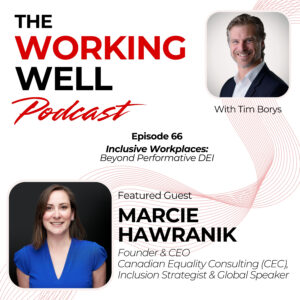
Podcast Summary
In this episode, Tim Borys sits down with Marcie Hawranik, founder of Canadian Equality Consulting, to explore the realities of building diverse, equitable, and inclusive workplaces. From unconscious bias and systemic barriers to leadership blind spots and meaningful action, Marcie provides both a global and deeply human perspective on what true inclusion looks like.
She shares practical steps for leaders to move beyond performative DEI and toward embedding equity into daily business practices. Whether it’s policies, decision-making, or company culture, Marcie emphasizes that inclusion isn’t a side project—it’s the future of thriving organizations.
✅ Key Takeaways
Inclusion must be intentional — good intentions are not enough without strategy and accountability.
Leaders set the tone — culture and equity start with visible leadership commitment.
Equity > equality — organizations must recognize systemic barriers and actively level the playing field.
Representation matters — diversity alone isn’t enough without voice, influence, and decision-making power.
Small actions create momentum — daily decisions and habits drive cultural change more than one-time initiatives.
Inclusive organizations perform better — equity fuels innovation, engagement, and long-term resilience.
Episode Links & Resources
Connect with Marcie here:
Website: https://www.canadianequality.ca/
LinkedIn: https://www.linkedin.com/in/marciehawranik/
https://www.linkedin.com/company/canadian-equality-consulting/
Instagram: @canadianequality
Podcast Highlights
Please note: This highlight is generated by a computer and may contain errors.
Introduction
Welcome to the Working Well Podcast. In this episode, host Tim Borys speaks with Marcie Hawranik about building truly inclusive workplaces. Marcie is the founder of Canadian Equality Consulting and a leading advocate for embedding equity into organizational culture.
Why Inclusion Matters
Marcie explains that inclusion is not about one-off training sessions or posting statements on social media—it’s about deeply embedding equity into how organizations operate. Without intentional systems, bias and inequity persist, even in well-meaning workplaces.
Equity vs. Equality
A key distinction is that equality gives everyone the same resources, while equity ensures people get what they need to succeed. Leaders must understand systemic barriers and create solutions that remove them, rather than assuming a one-size-fits-all approach.
Leadership and Accountability
Culture starts at the top. Leaders who demonstrate equity in their actions—through hiring, promotions, decision-making, and communication—signal what is truly valued. Without visible accountability, DEI efforts remain surface-level.
Moving Beyond Performative DEI
Many organizations adopt policies or campaigns that look good externally but lack substance internally. Marcie urges leaders to go beyond optics and ask: Are our systems and decisions truly equitable? Do our employees feel valued and represented?
Practical Steps to Drive Change
Marcie highlights practical actions leaders can take:
Audit current systems for bias.
Involve diverse voices in decision-making.
Set measurable goals for equity and inclusion.
Provide continuous education—not one-time workshops.
Recognize and celebrate progress along the way.
Inclusion as a Driver of Performance
Research consistently shows that diverse, inclusive teams outperform homogeneous ones. Beyond moral obligation, equity is a business advantage—driving innovation, creativity, and adaptability in an increasingly complex world.
Closing Thoughts
Marcie closes with a reminder: Inclusion is not a project, it’s a practice. Every action, policy, and interaction is a chance to move closer to equity. Leaders must model the change they want to see.

